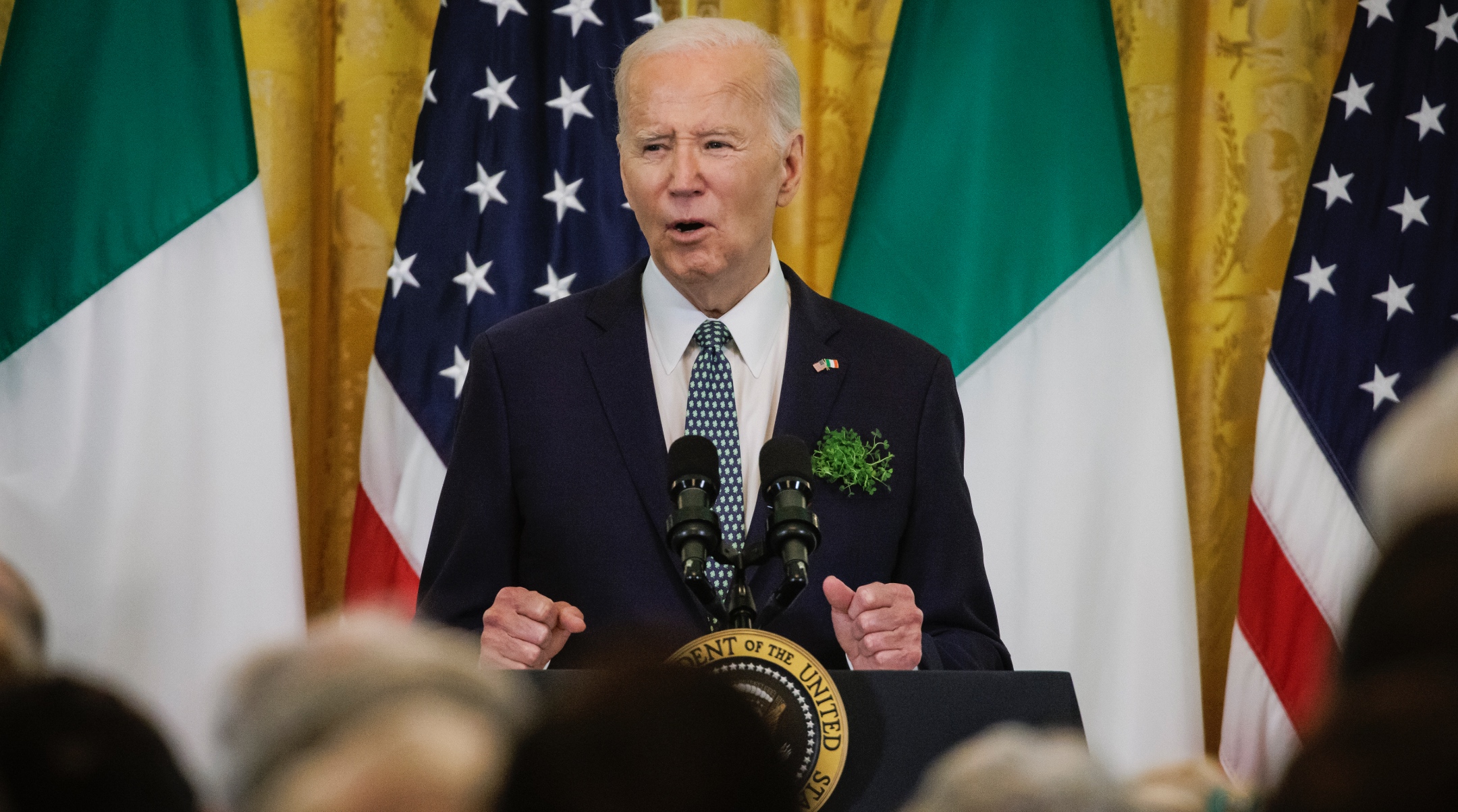Democrats clash over aid to Israel at meeting of party platform committee
A drafting committee meeting underscores the dilemma Democrats face as they head into their August convention: risk alienating Jewish voters, or risk alienating critics of Israel’s military campaign

President Joe Biden speaks during a Saint Patrick’s Day event with Irish Taoiseach Leo Varadkar in the East Room of the White House, March 17, 2024 in Washington, DC. (Samuel Corum/Getty Images)
(JTA) — WASHINGTON — The committee drafting the Democratic platform heard clashing visions of what the party’s Israel policy should be, with two witnesses urging continued military aid and one urging cuts.
Tuesday’s online meeting, convened by a subcommittee of the Democratic platform committee, underscored a dilemma the party faces as it heads into their August convention.
Any change to the robustly pro-Israel language in the Democrats’ 2020 platform could alienate Jewish voters and donors who are already rattled by months of protests against Israel’s war in Gaza and increasing criticism of Israel’s actions among Democratic lawmakers.
The Biden campaign, on the other hand, is seeking to stem discontent on the party’s left with the president’s support for Israel. That backlash has been especially pronounced in swing states such as Michigan where there is a substantial Arab American population. Fights also erupted over the Democratic platform’s Israel policy section in 2012 and 2016.
The Democratic platform meeting, one of several that will take place before the convention in Chicago, also came a day after the Republican Party published its platform, which includes unmitigated support for Israel as well as anti-immigrant language and pledges to erode the separation of church and state, both of which have long unsettled Jewish Americans.
Speaking in favor of continued assistance to Israel were Halie Soifer, the CEO of the Jewish Democratic Council of America, and Dana Stroul, a former deputy assistant secretary of defense who is now a senior fellow at the Washington Institute for Near East Policy, a think tank highly regarded by Israel’s defense establishment.
Stroul said President Joe Biden had reversed much of the damage that former President Donald Trump’s isolationist bent caused to U.S. deterrence in the Middle East. She cast U.S. support for Israel as part of the fabric of a robust defense policy. And she stressed that Biden coupled his support for Israel with plans to bring relief to the millions of Palestinians displaced by the war.
“The focus on human security and rights is why the Biden-Harris administration is pushing Israel to formulate a credible plan for Gaza’s recovery and stabilization,” she said. “Palestinian civilians deserve a future without the stranglehold of Hamas governance, as well as a viable political horizon for a state of their own alongside the Jewish democratic state of Israel.”
Soifer spoke of how closely Israel is held in American Jewish hearts. Her remarks signaled that changing the platform could cause damage for the Democrats among one of their most loyal constituencies.
“Eighty-two percent of Jewish voters identify as pro-Israel and have an emotional attachment to Israel, and 74% approve of President Biden’s handling of the war with Hamas, according to a November poll,” Soifer said, adding that the polling by the Jewish Electorate Institute and others also showed broad American support for the U.S.-Israel relationship. “The Democratic Party platform language on Israel should not be diluted from the strong starting point of four years ago.”
Elianne Farhat, who is of Lebanese and indigenous American descent, is the executive director of TakeAction Minnesota, a grassroots activist group. She described the U.S. Navy evacuating her from Lebanon in 2006, when she was visiting family during the Israel-Hezbollah war of that summer.
“I know what it is like when our country uses our immense power to promote good as well as when it misuses that power to spread pain, suffering and genocide,” she said. “I know what it’s like to have bombs paid for with my tax dollars falling on my head.”
Farhat, who is also a leader in the “Uncommitted” movement, which urged Democratic primary voters to vote “uncommitted” to protest Biden’s Israel policies, cited polling whose source she did not identify to back her claim that cutting assistance to Israel would be popular and reach disaffected voters.
“I’d ask you to consider the overwhelming sentiment among our constituents: 80% of Democrats support a permanent ceasefire in Gaza, 52% of Americans and 62% of Biden voters advocate for halting arm sales to Israel,” she said. “These numbers are reinforced by tens of thousands rallied nationwide.”
She urged the United States to advocate an immediate ceasefire in Gaza, and an embargo on arms sales to Israel.
The structure of the hearing, which lasted several hours, saw each presentation followed with friendly questions from members of the drafting committee who are sympathetic to the witness’s point of view. Jeremy Bash, a former top defense official in Democratic administrations who is now a consultant, spoke to Stroul and Soifer. Keith Ellison, the Minnesota attorney general who was a prominent critic of Israel when he was in Congress, spoke to Farhat.
The platform must be complete by the beginning of the convention, when it will be formally approved on the floor. The convention starts on Aug. 19.













